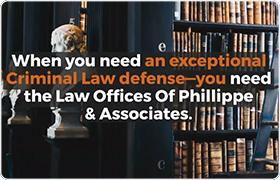Port Isabel RICO Act Lawyer, Texas, page 9
Sponsored Law Firm
-
 x
x

Click For More Info:
-
The Law Office Christopher Phillippe
104 North Express Way Brownsville, TX 78521» view mapCriminal Defense Law Helping Those Facing Difficult Times
We are confident in our ability to resolve difficult legal issues, and we will use our years of experience to represent your best interests.
800-659-6781
Not enough matches for Port Isabel RICO Act lawyer.
Below are all Port Isabel Criminal lawyers.
Aaron Wallace Rendon
Criminal, Family Law, Immigration, Mediation
Status: In Good Standing *Status is reviewed annually. For latest information visit here Licensed: 9 Years
Stephanie Jeanelle Rollins
Criminal
Status: In Good Standing *Status is reviewed annually. For latest information visit here Licensed: 19 Years
Marie Christine Cortez
Criminal, Divorce & Family Law, International Other, Family Law
Status: In Good Standing *Status is reviewed annually. For latest information visit here Licensed: 21 Years
Sheila Ann Garcia
Criminal, Family Law, Wills, Juvenile Law
Status: In Good Standing *Status is reviewed annually. For latest information visit here Licensed: 21 Years
Oscar Guzman
Criminal
Status: In Good Standing *Status is reviewed annually. For latest information visit here Licensed: 25 Years
Stephanie Elaine Burnett
Criminal
Status: In Good Standing *Status is reviewed annually. For latest information visit here Licensed: 24 Years
Janet Lee Leal
Personal Injury, Criminal, Family Law, Litigation, Juvenile Law
Status: In Good Standing *Status is reviewed annually. For latest information visit here Licensed: 38 Years
Gabriela Garcia
Accident & Injury, Criminal, Family Law, Personal Injury
Status: In Good Standing *Status is reviewed annually. For latest information visit here Licensed: 30 Years
David S. Gonzales
Credit & Debt, Administrative Law, Juvenile Law, Legislative Practice, Litigation
Status: In Good Standing *Status is reviewed annually. For latest information visit here Licensed: 27 Years
Estela Chavez Vasquez
Criminal, Family Law, Immigration, Juvenile Law
Status: In Good Standing *Status is reviewed annually. For latest information visit here Licensed: 19 Years
 Christopher Phillippe Brownsville, TX
Christopher Phillippe Brownsville, TX Practice AreasExpertise
Practice AreasExpertise